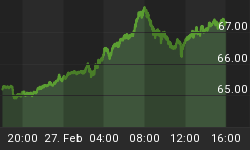David A. Rosenberg, chief economist and strategist for Gluskin Sheff and Associates, writes a very nice (and free) almost daily commentary about the markets and economy. I am sure many of you read Mr. Rosenberg, but if you don't, you can sign up here.
Today, Mr. Rosenberg has an interesting piece "Is The U.S. Dollar Next?" It is the second anniversary of the credit crisis, and after all the stimulus plans and bailouts and zero percent Fed Funds rate, the economy is still on life support. Or to put it another way: is this all we get for all the money thrown at this crisis? Today, GDP is negative; two years ago it was 5%. Unemployment is climbing towards 10% from a 5% level two years ago. The deficit is ballooning. Most importantly, despite all the money committed to rescuing the economy, there is still little clarity going forward.
Rosenberg conjectures:
The government has tried just about everything. Or has it? What if we were to tell you that the one policy tool that is unchanged since the summer of 2007 is ... the U.S. dollar? It is exactly the same level now, on any trade-weighted measure, as it was back then. The greenback is struggling at the 50-day moving average, and this could well be the next policy shoe to drop.
Rosenberg believes that it will be the rising unemployment rate at the time of the mid-term elections in the face of an improving economy that could be the catalyst that leads to a devaluation in the Dollar.
His first reason is self interest:
As we said above, the U.S. government has practically exhausted all of its policy options ... except for one; the U.S. dollar. It is the only policy tool that has not budged one iota since the crisis erupted two years ago. As we mull this over, we recall all too well this great book that a client referred us to a few years back and it was Robert Rubin's autobiography - "In An Uncertain World". What we learned (as did the client and whoever else has read it) was obvious -- the United States will always do what is in its best interest. Full stop.
His second reason is President Obama's tendency to use the FDR depression playbook:
In addition to knowing it is going to be an election year in 2010, we also know that we have a President who has, step by step, been taking feathers out of FDR's cap in dealing with this modern day depression. The one item that has yet to be utilized is U.S. dollar depreciation, and if memory serves us correctly, FDR snuffed out the worst part of the Great Depression when he unilaterally devalued the dollar to gold in 1933 by 40% (and fixing the price of gold at $35/oz).
Rosenberg summarizes:
But we are sure that as the unemployment rate makes new highs and increasingly poses a political hurdle in a mid-term election year, that it would make perfect sense, for a country that always operates in its best interest -- even if it may not be in everyone's best interest -- to sanction a U.S. dollar devaluation as a means to stimulate the domestic economy.
Remember, this is a premise. We are just conjecturing.
As I recently pointed out in the article, "Dollar Index: At Risk To Unravel", Rosenberg also highlights which assets and sectors will be the "beneficiaries" if the Dollar embarks on a downward path. It should be noted that Rosenberg's time frame is "sometime in 2010", and I think there is a high likelihood of a downdraft in the Dollar if prices make a weekly close below 79.46 on the Dollar Index (symbol: $DXY). Regardless, our focus on which assets will benefit is similar.
Certainly this is only a consensus of two, but I am happy to be in the company of such a well respected analyst!















